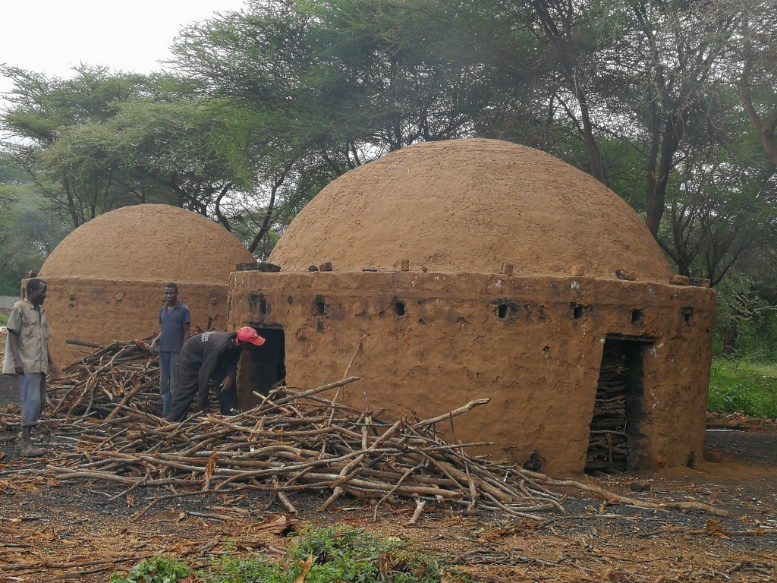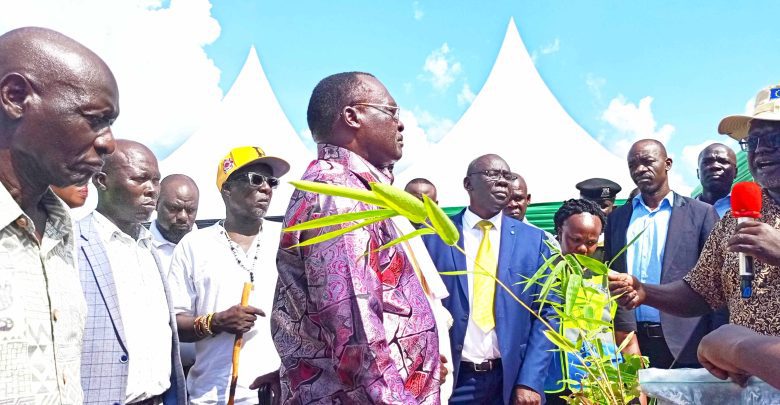
EnvironmentPolitics
UGANDA: CHIEF JUSTICE OWINY DOLLO LAUNCHES $350 MILLION NATIONAL TREE PLANTING CAMPAIGN FOR CLIMATE CHANGE MITIGATION
A Call to Action on Climate Change and Deforestation
GULU CITY, FRIDAY, SEPTEMBER 27, 2024
The sight of a lush, green landscape once common in many parts of Northern Uganda, including my childhood village of Patongo, is now a distant memory. Growing up, I could not see the next house even if it was just 50 meters away because the trees were so dense. But today, that rich geographical tree cover is history—deforestation has taken a heavy toll.
“Community-driven landscape restoration through tree growing for improved livelihoods and a healthy functioning ecosystem is now making significant progress in the region,” said Chief Justice Alphonso Owiny-Dollo, emphasizing the importance of reversing the damage caused by widespread deforestation.
The decision to host this year’s National Tree Planting Day in the Acholi sub-region, particularly at Sir Samuel Baker School, is a deliberate and meaningful one. It serves as a call to action to address the environmental challenges the region faces—chief among them, the widespread cutting of trees for commercial charcoal production.
In my youth, the small stream that fed into the Agago River was a vibrant ecosystem, teeming with life. During the dry season, we used to hear the croaking of frogs, which, at the time, we thought was just noise. But in truth, those frogs were announcing the arrival of the rains, as Chief Justice Owiny-Dollo recalled. “That is how connected we once were to our environment.”
A Call to Action on Climate Change and Deforestation
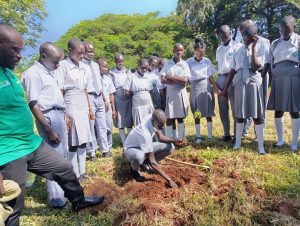
As we gather today, we are confronted with a stark reality: Uganda’s forest cover is disappearing at an alarming rate. Estimates show that only 12.4% of Uganda’s land area is covered with trees—down from 24% in 1990. This decline, compounded by the effects of climate change—including erratic rainfall, floods, droughts, locust invasions, and landslides—threatens our national food security and well-being.
The Acholi sub-region, once the breadbasket of Northern Uganda, now ranks among the poorest areas of the country. This is due to the degradation of the environment, which has been severely impacted by climate change and unsustainable practices.
To address these challenges, my Ministry has partnered with private sector players, development partners, and civil society organizations. Together, we aim to plant and nurture 40 million trees annually through the ROOTS initiative— “Running Out of Trees.” This campaign encourages the planting of one tree for every Ugandan citizen and fosters an inclusive and collaborative approach to reforestation and forest conservation.
“We are committed to reversing deforestation and restoring degraded landscapes, nurturing planted trees to maturity,” said Chief Justice Owiny-Dollo. “This is not just a campaign to plant trees—it is a mission to restore our environment and our future.”
Reversing Deforestation Through Sustainable Partnerships
The Acholi region has suffered greatly from deforestation, exacerbated by commercial charcoal production, especially given that it hosts nearly 70% of the 1.7 million refugees in Uganda. This has intensified the demand for firewood and building materials, contributing to further environmental degradation.
This year, the Ministry of Water and Environment launched a special tree planting initiative at Sir Samuel Baker School in Gulu City. This venue was chosen not only because of its symbolic importance but also because the school provides a unique opportunity to instill environmental education in the next generation of leaders.
As part of the initiative, the Ministry is supporting the establishment of a small-scale irrigation scheme at the school. This project will enhance food security and offer a platform for climate-smart agricultural practices, benefiting both the school and the wider community.
The Role of Communities and Schools in Environmental Conservation
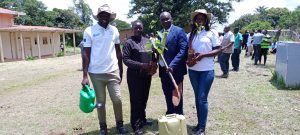
“Let us all join hands in the fight against climate change by planting trees, protecting our natural forests, and practicing responsible environmental stewardship,” Chief Justice Owiny-Dollo urged. “It is our duty to ensure that the Earth remains healthy and that future generations can enjoy the same resources we have today.”
The launch of the ROOTS campaign reflects the government’s commitment to reversing the environmental damage that has been done. It is an invitation for every Ugandan to engage in tree planting, protect wetlands, rivers, lakes, and hilly areas, and practice sustainable land management.
The Chief Justice continued, “In my own village of Patongo, where we once had lush forests like Bunga Pa Oding and the Akassia forest, the landscape has completely changed. The war years accelerated the destruction, but we must act now to reverse this damage.”
Collaborative Efforts and Institutional Support
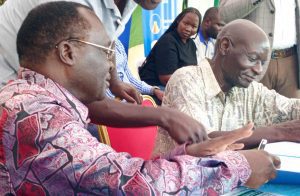
The event also highlighted the collaborative efforts of various organizations that have supported the tree planting campaign. Partners such as Bank of Uganda, Stanbic Bank Uganda, ABSA, Roofings Uganda, TotalEnergies, the European Union, UNDP, FAO, and many others were acknowledged for their contributions to the success of this initiative.
Hon. Aisha Sekindi, Minister of State for Water, was represented by the Commissioner for Water, while the Mayor of Gulu City and the Members of the Inter-Religious Council of Uganda also attended.
In addition to tree planting, community education on conservation was stressed as a key component of the project. Schools like Sir Samuel Baker are essential in teaching the younger generation about the importance of environmental protection. Through partnerships with local and international organizations, tree planting initiatives like this one are reaching new heights, with 150,000 tree seedlings being distributed to various schools and communities.
Local Initiatives and Future Vision
Dr. Kenneth Omona, State Minister for Northern Uganda, acknowledged the region’s history of environmental degradation. “In 1999, when I first came to Gulu, I was struck by how people spoke of the impending crisis. We are here today to not only restore trees but to restore our region to its former glory,” he said.
The event also featured speeches by notable figures such as C.D. Langolya, a renowned tree planter from Northern Uganda, who shared insights into the ongoing efforts to grow trees in the region. “Today, as we plant trees, we are not just restoring the environment, we are restoring hope and opportunity for our communities,” he remarked.
FAO’s Contribution to Environmental Sustainability
Mr. Antonio Overido, the Country Representative of the Food and Agriculture Organization (FAO) in Uganda, highlighted the ongoing efforts by the FAO to support sustainable tree planting in the Acholi region. “We have been supporting tree planting in this region for over 15 years, restoring 5,000 acres of charcoal land to reduce deforestation and promote sustainable livelihoods,” he said. FAO is also promoting alternative cooking technologies, such as the use of gas cylinders, to reduce the reliance on firewood and charcoal.
A Call for Unity and Action
In closing, Chief Justice Owiny-Dollo emphasized that this tree planting initiative is not just about restoring forests—it’s about creating a more sustainable and resilient future for all Ugandans. “The environment provides enough for everyone’s needs but not for everyone’s greed,” he concluded.
As we plant trees today, we are taking a step toward a cleaner, greener future. It is essential that we continue this effort throughout the year, ensuring that trees are protected, nurtured, and allowed to grow to maturity.
Together, let’s preserve our environment, protect our future, and create a legacy of sustainability for generations to come.



